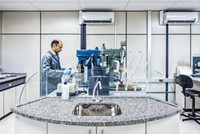Advertisement
Grab your lab coat. Let's get started
Welcome!
Welcome!
Create an account below to get 6 C&EN articles per month, receive newsletters and more - all free.
It seems this is your first time logging in online. Please enter the following information to continue.
As an ACS member you automatically get access to this site. All we need is few more details to create your reading experience.
Not you? Sign in with a different account.
Not you? Sign in with a different account.
ERROR 1
ERROR 1
ERROR 2
ERROR 2
ERROR 2
ERROR 2
ERROR 2
Password and Confirm password must match.
If you have an ACS member number, please enter it here so we can link this account to your membership. (optional)
ERROR 2
ACS values your privacy. By submitting your information, you are gaining access to C&EN and subscribing to our weekly newsletter. We use the information you provide to make your reading experience better, and we will never sell your data to third party members.
Business
Movers And Shakers
C&EN Talks With French Professor Claude Grison
The French biochemistry professor started a company to ensure her chemistry is applied to real-world problems
by Alex Scott
December 1, 2014
| A version of this story appeared in
Volume 92, Issue 48
As a teenager about to start university, Claude Grison came within a whisker of studying philosophy instead of science. She liked—and still likes—trying to answer the big questions.
In the end, she opted for chemistry because it enabled her to “observe and explain everything,” she says. Today, at the age of 54, she is a biochemistry professor at France’s National Center for Scientific Research (CNRS), in Montpellier. Her résumé lists a string of awards and 136 published papers.
Her early philosophical principles, though, continue to influence the direction of her scientific endeavor. A driving force for Grison is her desire to positively impact the environment through the application of novel chemistries that work in harmony with biological systems.
For years, Grison has had an ambitious vision of cultivating plants known as metallophytes, which hyperaccumulate metals, on soils contaminated by mining waste and then harvesting the metals from the leaves and converting them into industrially useful catalysts. Today, Grison heads up a team of 10 researchers developing such catalysts.
Until recently, however, Grison had a nagging feeling about the lack of commercial interest in the chemistry her team was developing. If the catalysts derived from metallophytes were to be commercialized, Grison realized, she would have to make them herself. And so two years ago she launched a company, Stratoz.
“I wasn’t nervous about it. It was no problem to start,” she says. She secured $1.2 million in start-up funding from Truffle Capital, a Paris-based venture capital firm. Today, Stratoz is fully owned by CNRS and Truffle.
Stratoz already has a staff of 40. Grison spends about 20% of her time running the firm’s lab of 20 scientists located just across the hall from her CNRS chemists. While the CNRS team investigates basic chemistry for making catalysts, the Stratoz scientists are preoccupied with scaling up the processes. The lab is working on about 100 catalysts featuring various combinations of transition metals including cobalt, copper, iron, manganese, and nickel. “Yes, I’m busy, but it’s very exciting,” Grison says.
The company’s process involves harvesting the older leaves of plants, analyzing them, removing organic matter, and applying acids to yield metals that will create a catalyst with the desired activity. The lab is targeting compounds that could be used by fine and specialty chemicals firms, such as a zinc-based catalyst for making esters of interest to the fragrance industry.
“Understanding the catalytic activity of the final compound is the difficult part,” Grison says. Unlike conventional catalysts, those being developed by Stratoz’s team have multiple centers of activity. Research published by CNRS and Stratoz in August in Environmental Science & Pollution Research (DOI: 10.1007/s11356-014-3445-z) indicates that these polymetallic catalysts “can perform better and provide much higher selectivity than classical homogeneous and heterogeneous catalysts.”
Stratoz claims that its approach has the potential to remediate contaminated soil at a fraction of the $1 million per acre it would otherwise cost mining companies to excavate and bury such soils, but it is the value of the catalysts that will generate the lion’s share of Stratoz’s income, Grison predicts.
Stratoz already has deals in place to develop catalysts for Chimex, a subsidiary of cosmetics giant L’Oréal, and Takasago, a Japanese flavors and fragrances firm. Grison is optimistic that Stratoz will be making commercial quantities of its catalysts in about a year’s time. To fund this research, Grison expects to line up an additional $2.5 million to $3.5 million, also from Truffle, in the coming days.
The start-up has several metallophyte plant trials under way on contaminated sites in China, Greece, Cuba, Democratic Republic of the Congo, southern France, and the Pacific islands of New Caledonia.
The plants Stratoz uses are not genetically engineered. Instead, Grison and her team observe local flora and select the species that are the best hyperaccumulaters. Cuba is home to 60 species suitable for accumulating certain metals such as nickel. In contrast, only three plant species are suitable for a site in southern France contaminated by zinc and thallium. Each site is different, but a 1-acre crop might yield 40 kg of metals in a year, Grison says.
In addition to its practical application, Grison sees her work bringing chemistry and biology closer together. “Often there are different communities, such as chemists and biologists, that can’t agree on the best approaches to science,” she says. “If Stratoz succeeds it would show that chemistry and biology can be combined to create ecologically sound solutions.”
Grison is optimistic about Stratoz’s commercial prospects, yet she emphasizes that “it’s not about making money but solving a problem.” Unlike some entrepreneurs who say making a profit is secondary, Grison means it—she has no shares in the company and is not getting paid anything above her CNRS salary. She has her eye on the bigger picture: the creation of a new class of environmentally friendly and industrially useful catalysts.






Join the conversation
Contact the reporter
Submit a Letter to the Editor for publication
Engage with us on Twitter